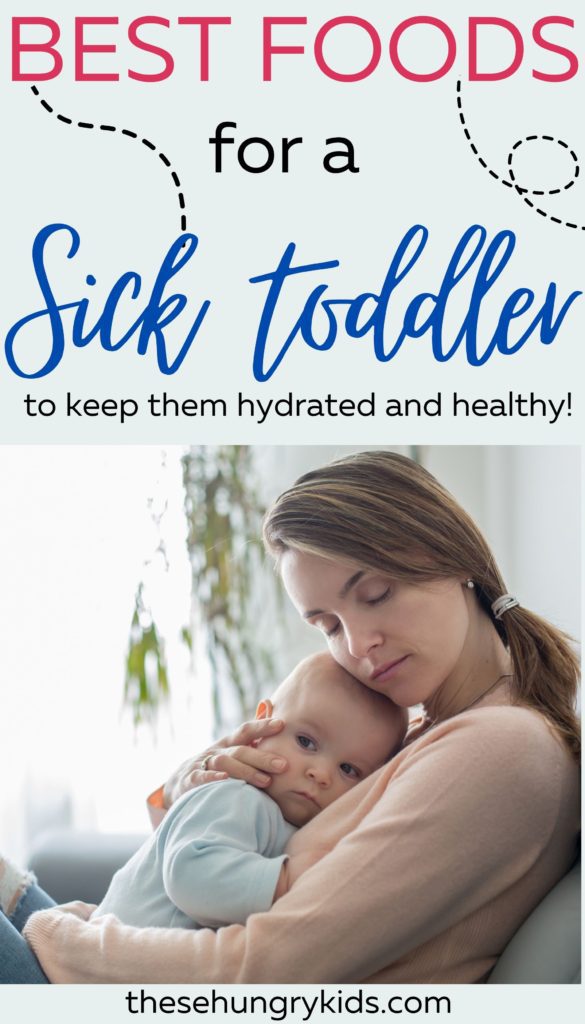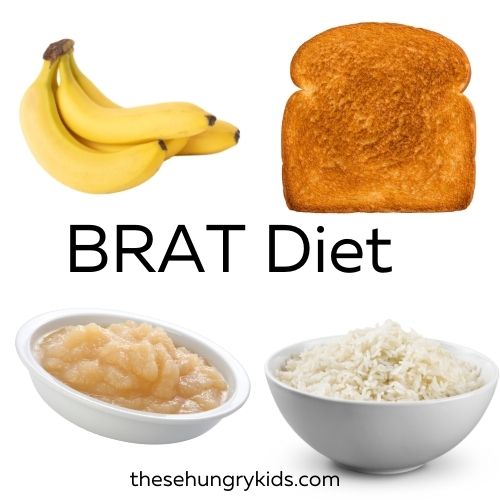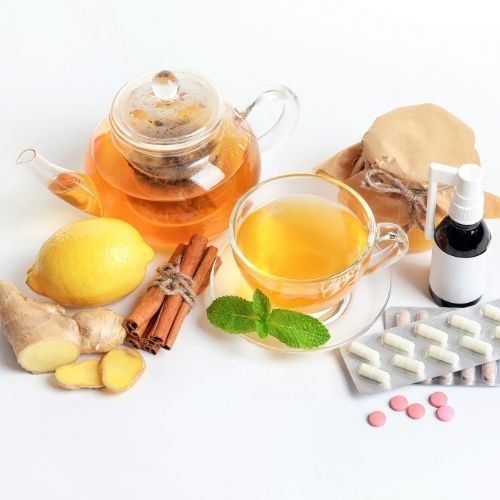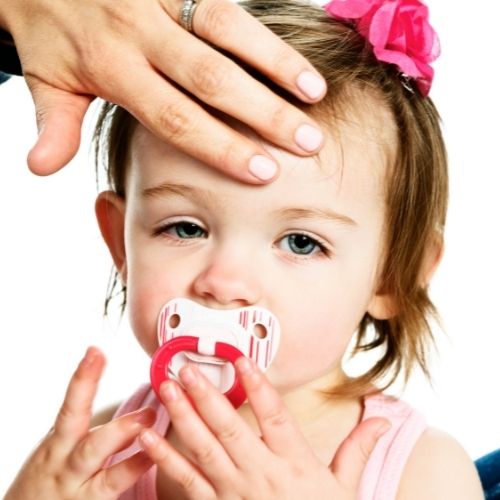It’s inevitable – eventually your toddler will get sick! As heartbreaking as it is to have a sick baby, sometimes getting the right food in their bodies can help them feel better. In this post, you’ll find the best food for sick toddlers.
With cold and flu season here, we need to be prepared for sick toddlers. Since sick kids are notoriously hard to feed, it’s always a good idea to stock up on the best foods for sick toddlers. There is a delicate balance between what sounds good and what will help them feel better!

This article is not intended to replace medical advice. Always contact your health care provider with questions or concerns regarding your child’s health. Please read my full medical disclosure here. This post contains affiliate links. I may earn a small commission if a purchase is made using the links from this page.
Related: 7 Sick Day Essentials For Your Entire Family
Best thing for a sick toddler…
The number one thing to help a sick kid is hydration! Push fluids in any way you can since most illness cause fluid to be released from the body (think diarrhea, vomiting, mucus production, and sweating from a fever).
Here are some ideas to hydrate your toddler
- Electrolyte solution. We use Pedialyte in our house, though sports drinks are great, too. I like that the Pedialyte comes in ready to use packets whenever illness strikes.
- Fruit juice. You may wish to avoid citrus fruits if your child has a sore throat or upset stomach as citrus is very acidic.
- Ice pops. Popsicles are a good way to rehydrate your toddler, plus they feel like a treat! Pedialyte makes freeze pops that have electrolytes as well. You can usually find them by the electrolyte drinks in the pharmacy or grocery store.
- Coconut water. Like sports drinks, coconut water is loaded with electrolytes and vitamins.
- Ginger ale. Great for a stomach bug, ginger ale that is made with real ginger can help settle a tummy. If your child does not like the carbonation, stir the bubbles out with a spoon.
- Broth. Soups and stews are great for getting some nutritious foods back into their diet. Sipping on some broth or soup can be soothing to a sore throat or upset stomach, and will help with hydration.
The most important thing is that your child is getting plenty of fluids. If that means extra sugary drinks for a few days, that’s OK. You can get back to your normal routine and regular diet once your child is feeling better.
If you are breastfeeding, you may notice your toddler wants to nurse more than usual. This is totally healthy and normal. Breast milk has properties that help them fight infection as well as to relieve pain (source).
You’ll also want to monitor for signs of dehydration. In a toddler, you may notice less wet diapers, dark colored urine, extreme irritability, low energy, and faster breathing or heart rate. If you are concerned your little one is very dehydrated, it is time to call your child’s doctor.
Related: 25+ Healthy Toddler Snack Ideas (That They’ll Actually Eat!)

Best food for toddler with upset stomach
When your child has a stomach flu or an upset stomach, it’s best to stick to bland foods and plenty of fluids.
You may have heard of a special diet that can help with an upset stomach. Your child’s pediatrician may recommend you stick to the BRAT diet for a few days.
Related: What To Feed Your Toddler With Tummy Troubles
BRAT diet for sour stomach
The BRAT diet consists of bananas, rice, applesauce and toast.
These foods are great for tummy bugs since they are easy to digest. If your toddler has been struggling with vomiting or diarrhea, some dry toast, plain rice, apple sauce or stewed apples, or a banana are some good foods to try.

Again, encourage your child to drink extra fluids to prevent dehydration. Offer frequent sips of cold liquids to help their tummies rest. Clear fluids, like plain water, electrolyte drinks, popsicles, and fruit juices can all help prevent dehydration.
Best foods for toddlers recovering from a stomach bug
It’s normal for your toddler to have a decreased appetite for a couple of days after a stomach bug. Some sick children are afraid to try solid foods after a stomach flu because they are afraid to vomit. Stick with simple foods that are easy to digest until they are back to feeling normal. A bland diet full of wholesome small meals will help them recover.
Clear soup, like chicken noodle soup or vegetable soup, can be very hydrating and soothing. Avoid thick soups, like tomato soup, until they are fully recovered.
Offer plenty of small meals through the day. Avoid fatty foods and foods that are heavily processed as that may upset their stomach again.
Steamed vegetables, sweet potatoes, soups, toast, crackers, plain pasta, apples, bananas, and yogurt are some good nutritious foods for an upset stomach.
Related: Cold Medications During Pregnancy – What’s Safe To Take?

What to feed a kid with a sore throat or cough
Kids with a sore throat are going to like the same thing that adults with a sore throat like. Think about what would be most soothing.
Warm things, like chicken soup or hot chocolate, can be very soothing to a sore throat. If your child prefers colder items, try ice pops or milk shakes.
While it may seem like a good idea to give your child an orange for some Vitamin C, avoid citrus fruits and acidic foods. These can make a sore throat in toddlers much more irritated.
If your toddler is over the age of 1, honey is a great thing to give for a sore throat or cough. A few studies have shown honey to be very effective in reducing cough.

Will dairy make a cough or cold worse?
You may want to avoid dairy products if your child has a runny nose or cough. We used to think that dairy products, like milk, cheese and yogurt, made mucus thicker and harder to clear. There is no scientific evidence to support that dairy products increase mucus production or make mucus thicker (source). If your child wants to drink milk, a smoothie, or a milkshake to soothe their throat, that should be totally fine.
Related: What to Think About When Choosing a Pediatrician
What to give a toddler with a fever
If your child has a high temperature, your child’s pediatrician may advise you to give them a fever reducer like acetaminophen (Tylenol).
With a high fever, hydration is the most important thing. Make sure your toddler has a good fluid intake. Cold drinks, popsicles, broth, or whatever else your child drinks can help prevent dehydration from a fever.

Your child might have a little appetite as they recover from having a fever. The main thing is that they get enough fluid and plenty of rest. They will get their appetite back when they are feeling better.
What to feed a sick child that won’t eat
Some kids just won’t eat when they’re sick! It can be very frustrating, but the most important thing is that they stay hydrated.
Your child’s diet may be a bit different when they eat, and that’s OK. Let them eat whatever they can stomach – whether that be ice cream or chicken soup! Offer healthy foods and small meals frequently.
Giving foods with a high water content is an easy way to meet both goals. Things like chicken soup, popsicles, and smoothies made with fresh fruit can be some of the best foods for sick toddlers.
Related: 13 Ways to Get Your Toddler To Eat

How to keep your toddler from getting sick (and help them recover from illness)
The best thing you can do to help your toddler stay healthy is frequent hand washing. This is the number one way to stay healthy!
You should also make sure your child’s diet is full of healthy fruits and vegetables, as these are loaded with vitamins and antioxidants. Ensure your little one is getting enough Vitamin C during cold and flu season, as this can help boost your child’s immune system.
Elderberry supplements can also be a great immune booster. I always reach for elderberry syrup when my kids start showing signs of illness.
Other things to do when your toddler is sick
There are many ways to help a sick toddler that don’t involve feeding them.
Encourage plenty of rest and quiet activities. Things like coloring books, building blocks, and arts and crafts can keep them busy without overexertion.
Offer plenty of time for snuggles. Sick kids often need extra time to rest and connect with a parent.
If your toddler has an upper respiratory infection, try running a cool mist humidifier while they sleep. You can also try a warm bath, sitting in a bathroom with a steamy shower running, and a baby-safe chest rub to help them breathe a little easier.
Saline nasal sprays are also wonderful for stuffy noses and are safe for kids of all ages.
I hope your family stays healthy, but in case they don’t, I hope they recover quickly.
Wash your hands and stay hydrated!


